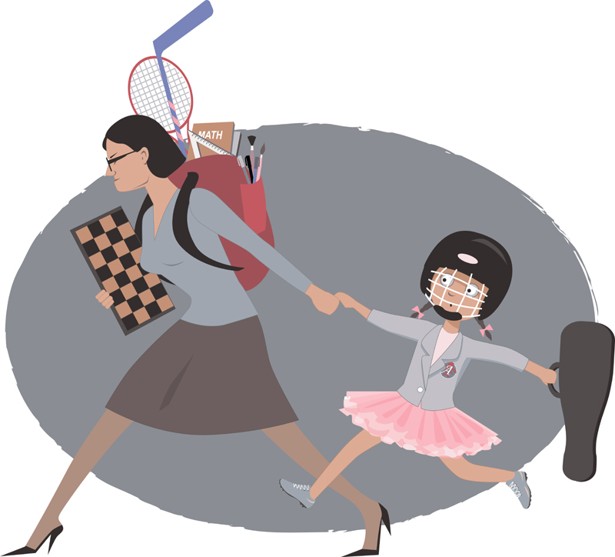
Tiger parents, don’t sacrifice happy childhoods for long-term comfort – it’s about striking a balance
Traditional Chinese parents – especially mothers – can push children to breaking point with their over-dominance and quest for perfection. That is not a healthy attitude, says a Hong Kong concern group
Just as every manager has their own way of supervising their staff, every parent takes their own approach to raising their children.
Let’s imagine there are two different children. One is a high achiever who dedicates most of his or her free time to extracurricular activities. The parents have always actively encouraged the child to be their best, but this child doesn’t have a lot of free time for friends.
‘What’s an orgasm?’ my 11-year-old asked. How to teach kids about sex
The second child achieves decent grades in school and takes part in their fair share of after-school clubs, but is by no means a high achiever. Nevertheless, the parents are supportive and dish out praise when the child does particularly well.
Which child do you think is the happier one?
Laissez-faire or “hands-off” parenting is rare in Chinese households because it is perceived as parental abandonment. And we can’t have that in Chinese families.
Traditional Chinese parenting has always been strict and hands-on. Amy Chua’s 2011 memoir Battle Hymn of the Tiger Mother shone the international spotlight on this ultra-strict parenting style. Her book encapsulated the pushy, sometimes extreme and demanding Chinese style of parenting.

Advocates of strict parenting believe no parent should deny, or pretend, that achievements don’t matter. They believe it is only through persistence and making constant demands that they can push their children to improve. This may be true. But it is also true that perfectionist parenting, as employed by many Chinese mothers, can push children to breaking point.
Tiger mothers often believe happiness is overrated but love is not. They love their children so much that they would do anything to make sure their offspring are prepared for life, even at the expense of childhood happiness. They believe their hard work will eventually pay off and earn their child something more important: long-term happiness.

That is not a healthy attitude, says Annie Cheung Yim-shuen, a spokeswoman for concern group Parents United of Hong Kong.
“Tiger mums are a formidable force. They demand their children to act and behave according to their wishes. We are not just talking about academically, but everything else in a child’s life,” Cheung says.
While parents must have expectations of their children and hold them to account, Cheung explains, tiger mothers take things to the extreme.
“Tiger mums want their children to be high achievers in academics, as well as in everything else in life. And to make that happen, they would, without hesitation, give up their lives to groom their children’s. They would go as far as sacrificing all their free time, and sometimes even their marriages. It’s quite scary because it appears that they see their kids’ success as an extension of theirs.”

Tiger mothers often feel a sense of inadequacy, Cheung says. They want their children to fulfil their unfulfilled dreams and be able to achieve what they could not when they were young, either academically or in other parts of life.
It is common for such controlling parents to see their children as personal possessions, she adds. “Tiger mums see their kids as their top priority and tend to be most at ease when their children are within arm’s reach, so they can have full control over them. When you have tiger mums around, nobody can fully relax – even themselves.”
Remember to give credit when credit is due. Reward your kids when they deserve praise. But remember to keep your authority consistent and establish clear limits
Another problem is that some tiger mothers can be strict one minute but swing to another extreme the next, their actions often ad hoc depending on the situation. These mothers are constantly sending mixed signals to their children.
“For example, they may ban their kids from playing too many electronic games on their phone, but then the next minute they may be OK with it because they need to distract their kids to have some free time to themselves,” Cheung says. “This kind of inconsistent behaviour in parenting is very confusing for the kids who have no idea what proper discipline is. And very often they will grow up to become quite rebellious, especially when they reach their teens and beyond.”
Cheung suggests that ground rules must be established when children are young and there should be no compromise once the rules are set. “For example, if no phone use is allowed at dinner, both parents and kids must be bound by the rule. Ultimately, family education is most important.”

Cheung has several pieces of advice to help parents avoid becoming too domineering.
“Don’t be too strict, don’t be too relaxed and try to strike a balance. It’s all about the middle way. Remember to give credit when credit is due. Reward your kids when they deserve praise. But remember to keep your authority consistent and establish clear limits.”
Don’t make the mistake of trying to be your child’s best friend. “You should never strive to be their best friend. They should tell you secrets and seek advice not because they treat you as best friends, but because they respect and love you as parents. You should always maintain that distance and parental authority.”
Hong Kong bosses, think again: working mothers are a bonus, not a burden
Finally, Cheung suggests drafting a simple wish list of the qualities you would like your child to possess to help form a proper parenting mindset. “This list will help you better visualise those qualities. It should just focus on the qualities of the desired personality such as being inquisitive, polite, patient or kind.”
Most parents just want to raise a child who grows up to be healthy and happy. Remember when you raise a child: you reap what you sow.
Luisa Tam is a senior editor at the Post

